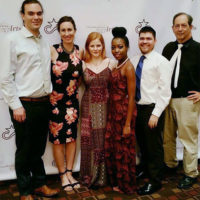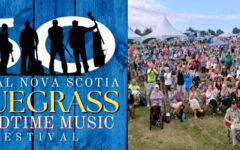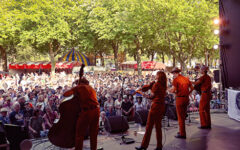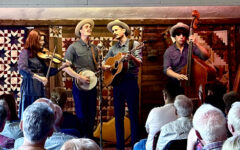
One outgrowth of Anni Beech’s Jam Pak Blues ‘N’ Grass Neighborhood Band, based in Chandler, Arizona, has been the formation of two professional-level bluegrass bands, Greenwood Sidee and Cisco and the Racecars.
The second of those aggregations, Cisco and the Racecars, a cosmopolitan troupe led by Francisco Briseno, made an eight-day cultural visit to Ukraine at the end of June/early July last year (2018).
Cultural exchanges aren’t new to US bluegrass musicians; in 2010 Pete and Joan Wernick became the first Americans to tour in Russia as a bluegrass act; the Johnson Mountain Boys spent a month in Africa in 1984, on a tour organized by the United States Information Agency; Cane Mill Road were U.S. representatives in the 2015 youth El Concierto En Iguazu (Iguazu in Concert) in Argentina; at the behest of the U.S. State Department, the Henhouse Prowlers have been to central Asia, various parts of Africa, Russia and Arabia. In 2007 Bob Perilla & Big Hillbilly Bluegrass visited Moldova, Croatia, Georgia, Tajikistan and Kyrgyzstan, in another tour sponsored by the US State Department.
Della Mae have visited many countries as part of the American Music Abroad program established under auspices of the U.S. Department of State’s Bureau of Educational and Cultural Affairs. They have undertaken a series of extended trips to Pakistan, Kazakhstan, Kyrgyzstan, Tajikistan, Turkmenistan, Uzbekistan, Brazil, Saudi Arabia, and the United Arab Emirates, playing concerts for local audiences as well as collaborating with local musicians and participating in children’s music-education programs.
There have been several visitors to the Sultinate of Oman – Chris Stuart and Backcountry; Lost Highway; and Eric Uglum and Sons; and more recently Bob Perilla & Big Hillbilly Bluegrass. All had a cultural element, although the tour by Perilla was the only one that was made on behalf of the US State Department.
One of the latest group of ambassadors is the aforementioned Cisco and the Racecars, whose members are Briseno (banjo), with Chester Carmer (mandolin, fiddle and lead vocals); the classically-trained violin player from Houston, Texas, Giselle Lee (fiddle and banjo, and lead and harmony vocals); Joelle Tambe-Ebot (bass and vocals); Katie Buetow Carmer (cello and vocals); and Mark Hickler (guitar, banjo and vocals).
The current members have been together since the fall of 2013.
They won the band contest at the Pickin’ in the Pines Festival in 2014, and with that win they conquered all four bluegrass band contests in Arizona. As a result of their success they were a featured band there in September 2015. Clearly, they were going somewhere … fast!
Their week-long tour, Bluegrass in Ukraine, was arranged by Peace Corps volunteer Alan M Young, who was at the time just starting the third year of an assignment to the city administration offices in Khmelnytskyi, Ukraine.
Most of his work is about organizing a modern system of municipal solid waste management that is consistent with European standards. “It’s a 30 million Euro project with many components,” Young explained. “I also help people learn English and do other economic development activities.”
“I am here to share American culture and to learn about Ukraine, a country I have come to love. As a Peace Corps Volunteer, I live with a Ukrainian family and serve without compensation,” Young relates. That’s a significant change from being a sailor who navigated his 50-foot ketch, S/V Victoria from California across the South Pacific to New Zealand. “Quite an adventure,” he agrees.
Young goes on to relate what led to the Bluegrass in Ukraine tour …..
“I’ve enjoyed bluegrass music since I was a kid and play the banjo poorly. Bluegrass is hard to come by in Ukraine, but traditional Ukrainian folk music is the ‘high lonesome’ sound that bluegrass enthusiasts can’t get enough of. After hearing a local Ukrainian folk group, I started thinking about how we might put bluegrass and Ukrainian music together — and bluegrass in Ukraine was conceived.
I am so happy that Cisco and the Racecars was able to come for this tour – they made me proud to be an American. They represent the best qualities of Americans and were outstanding cultural ambassadors. Besides their incredible musicianship, they demonstrated a genuine curiosity about Ukrainian people and culture.”
Of the actual tour, Young points to two reasons why it was a success ….
“Bluegrass in Ukraine was one magical moment after another. A highlight for me was at the concert in Khmelnytskyi, when the 40-member folk choir walked in from the back of the packed Dom Koltura theater. They wore traditional clothes and sang Choir of the Bells. In America, this song is performed at Christmas time, but it was originally from Ukraine. I started choking up and I could see that the band members were deeply moved as well.
Then, the Americans started singing a traditional Ukrainian song, in Ukrainian. Every jaw in the audience dropped open. Ukrainians can hardly imagine that Americans would make the effort to learn their language, much less sing a favorite song so beautifully. Then, the choir joined in and everyone was crying and whooping and clapping . . . I just will never forget that moment.”
Luthier Mark Hickler is the elder statesman in the band; he started volunteering with Jam Pak about 17 years ago.
Hickler remembers …..
“I met Cisco when he was 10 years old, and I was his banjo teacher! I met Joelle when she was about 12, and Giselle was about 14 years old.
The two other members are late-comers to the Jam Pak family; Katie Carmer is from Okemos, Michigan, originally, a self-described Yankee; and Chester Carmer joined in January 2013 and it was he who suggested the band name Cisco and the Racecars (changed from The Real Deal).”
He shares this insight into the band’s evolution …
“Cisco started the band over five years ago, and when there were some personnel changes, I was brought on to play rhythm guitar. Additionally, Cisco recruited Chester and Katie by posting on Craig’s List, an online forum. Incidentally, Chester and Katie met by joining the band and are now married. When I play with these young people, I feel like I am playing music with beloved nieces and nephews. We are different from many bands in that men and women are equally represented, and we are international. Cisco was born in Mexico and Joelle was born in Cameroon.”
Then reveals some of the background to how proposals evolved ….
“So, when we heard we might have the chance to bring music to another country, we were thrilled. The Ukraine tour was originally the idea of Alan Young, a long-time Peace Corps volunteer in Ukraine. Alan is also a banjo player and thought that it would be a wonderful way to show a bit of the spirit of America to Ukrainians using bluegrass music as the means. We had ups and downs with our funding proposal. The Trust for Mutual Understanding was strongly interested in supporting the venture, but our original proposal for a two-week tour was too expensive. Cisco and Mrs. Beach kept the dream alive, and eventually a one-week tour was approved for funding. The American Embassy in Ukraine also pitched in.
Alan was looking for a band that would mix and mingle rather than retreating to a hotel room. Based on the Jam Pak philosophy, we were very happy to do that. We had a jam session in Khmelnytskyi with some local musicians, and the guitar player who participated expressed an interest in learning banjo. When Alan Young came back to the US for a visit recently, we sent him back with a banjo! My personal dream come true would be to go back and have a bluegrass camp.”
This video reveals some of the highlights, as well as a few mundane moments, of the tour …
Hickler was determined to make the most of his opportunity ……
“I started studying Ukrainian about a year ago and I was determined that we would show respect and interest in their language and culture. We also learned one Ukrainian folk song that was very well received. I think all the band members were moved by our encounters with Ukrainian people. For me it was a life-changing experience.”
In conclusion, he makes this observation about an aspect common to life in Ukraine and the roots of bluegrass music ..
“Village life is still a vital part of Ukrainian culture. Bluegrass has its roots in the Appalachian village, and I feel strongly that bluegrass music, presented thoughtfully is potentially a great way to bridge our two cultures.”
Anni Beach, who was part of the entourage, was overwhelmed by the reception that she received, noting that it was young people, particularly, who wanted to befriend her …
“I had no idea what to expect, and had almost no knowledge of Ukraine or that part of the world. Being with the band that had evolved over many years from Jam Pak was in itself a fabulous feeling. But the welcome that I received from Ukrainian people wherever we went was astounding. The young people, especially, wanted selfies with me and to give me hugs.
I am nearly 75 and I have long silver braids always worn with a bandana, and my own style of clothing mostly from Savers or Goodwill. I asked why all the attention, ‘I want to be just like you when I’m old.’ It was explained that most Ukrainian people, once they reach 60, just retreat into a sedentary life. My fun and joy throughout the entire experience was to talk to people and be warm and friendly, giving out postcards with the band photo and a Ukrainian greeting on the back. To go in to a different country, where few spoke English, and to feel this kind of acceptance and love was really beyond anything I’ve ever experienced.”
Katie Carmer was very keen to remember as much as possible about her time in Ukraine, before too much of the detail slipped into a blur. She shares her reflections on her experiences (notes written very shortly after her return to U.S.A.) ….
“When I first learned that my band was being considered for a musical diplomacy mission, I didn’t understand what that term meant. Diplomacy builds trust, brokers peace, and creates a stable future. It seemed to me the work of lawyers and politicians, not a bluegrass band—and surely not me, a full-time English teacher and part-time folk cellist.
Over the course of eight days in Ukraine, I came to understand the idea of diplomacy in a new light. Diplomacy is friendship; it is laughter over a shared meal and finally being able to pronounce ‘coffee, please,’ in Ukrainian. On this trip, diplomacy was the music of two groups of people separated by continents, oceans, traditions, and languages, but tied together by shared themes and melodies.
There are too many remarkable moments from our trip to document here—I could write a page on our bus driver, Viktor, who did not speak English but, always walked next to me and insisted on carrying my cello; or another on the luxurious decency of Ukrainian gas stations, where you can enjoy a cappuccino and a freshly baked croissant.”
In these notes (that follow) Carmer focuses on a few transcendent moments from the band’s trip that defined for her the power of music in building relationships between people and, ultimately, nations.
The Song
“One of my favorite moments from our trip began before we even left Phoenix. Our guitarist, Mark, started learning the Ukrainian language a year before our departure, and as part of that process he learned two traditional folk songs. One of the songs is called Halya Bearing Water, and it begins with a slow acapella harmony. I knew I wanted to be the second voice in that harmony the first time I heard the song. It is haunting and beautiful and, though I still only have a vague understanding of the song’s meaning (a scorned lover by a river, I think), I loved the way the words felt in my mouth. There is something smooth and round about Ukrainian syllables that makes me think I knew the language and forgot it.
I didn’t know how our Ukrainian audiences would react to our performance of Halya. Would they be delighted, or would our mispronunciation of the words be comical? Was it really that famous of a song, or would it only be remembered by a few grandmothers in the audience?
I needn’t have worried. Without fail, the audience erupted with excitement after Mark and I sang the first few syllables of the song. They sang along with us; they clapped and danced when we picked up speed in the second verse. This was definitely a very famous song that everyone knew. On the second to last night of our tour, we had the opportunity to sing Halya with the incredible Khmelnytskyi Municipal Choir. This talented group sings everything from folk standards to classical tunes to Route 66 (which we also collaborated on).
At first, I was nervous to sing in front of such wonderful musicians. I’ve never considered myself a strong vocalist. In this situation, I was uncomfortably aware of the airy quality of my voice compared to the richness of the choir. Surprisingly, the choir director loved our introduction so much that he had us sing the acapella verse again at the end of the song. During the lively middle section, one of the choir members whipped out an accordion, which he played expertly. With the added power of the choir and the accordionist, the song took on a rich new quality that I’d never heard in our previous performances or rehearsals. It made me think of the past, of the previous generations that sang this song at fireplaces in the middle of winter. For a moment, it seemed that a window to the had past opened, and I could feel the breeze blowing from 100 years ago.
After we finished playing and singing and dancing with the choir, we smiled at one another and left the stage. I couldn’t have said more than ‘good evening’ to them, and they couldn’t have said much more to me. Nonetheless, I felt connected to them. We had performed together in two languages, each of us making the sounds of the other’s tongue. We were following the rules of pitch and rhythm that need no words.”
The Jam Session
“I’ve participated in many unpleasant jam sessions. Sometimes, I don’t know any of the songs and can’t figure out what to play during my break. Sometimes the players are competing rather than listening to each other, and it becomes a race to see who can play fastest and loudest.
The jam session in Khmelnytskyi did not fit into either of these categories. In fact, it forced me to create a new category: the transcendent jam.
Picture this: A guitar, a banjo, a mandolin, a fiddle, a cello, and a bass. That’s our band. Now, add a second guitar (a jazz guitar, as it happens). Throw in a keyboard. Finally, for good measure, add a baritone saxophone. Oh, and a tenor sax too.
Would you expect this ensemble to create coherent music that is enjoyable to listen to? I know my hopes were low… until that first sax player made his beautiful, syrupy entrance into the Milk Cow Blues. And then the second sax started to harmonize with him. I have never heard anyone play the saxophone so beautifully. I later learned that Khmelnytskyi has a vibrant jazz scene, complete with a jazz festival every two years.
The guitarist and keyboardist were equally fantastic. The keys in particular helped us transition from blues to jazz to pop with ease. As with the choir, we could not communicate verbally with our musical counterparts, but we didn’t need to. We simply listened to the songs that were unfamiliar, drew inspiration from what others were playing, and figured out how to contribute to the whole.
A good jam is kind of like a dance. In a given song, most of the players will want to try their hand at a break, but they want to enter tastefully and respectfully, ensuring they don’t barrel over someone else by accident. They watch for the subtle movements that precede a solo—a step forward, a breath in, a glance across the stage. No one is in a rush, because everyone is enjoying hearing what her colleagues are creating. (For instance, I know I stood on the stage with my jaw dropped for a good thirty seconds after the saxophone duet began).
I did what one does in a good jam—I waited, I listened, and I was inspired. And then I took a risk. What I haven’t mentioned yet is that we were plugged in and amplified, which is unusual in a jam session, and we were playing outside in a courtyard in front of a growing audience of at least 200 people. Any mistake would be very loud and very public. But it was one of those rare nights when improvisation comes easily and without thinking. And so I stepped forward and played a solo on a song I have never practiced before—My Way, by Frank Sinatra.
As I finished the phrase, I was looking down. I heard my bandmates calling my name and raised my head; the tenor sax player was looking at me with an expression that I somehow knew meant, ‘Let’s play a duet.’ For me, it was a magical moment. I was able to let go completely of my anxiety about hitting the right notes, and that freedom allowed me to play boldly and creatively. I understood what the sax player was thinking, and he understood me, too.
Later that night, still elated, I marveled at the way all the decisions in my life so far had led me here. The unlikely decision to major in music in college; the decision to move from Michigan to Arizona, where I knew no one, for a teaching job. The decision to respond to a Craigslist ad for a bluegrass band when I knew nothing about bluegrass. The decision to join that band and marry the mandolin player. The band’s decision to accept the generous yet daunting offer to tour Ukraine and share our music. And, finally, my decision to take a step forward and play that duet with the sax player.
I never could have planned this. Like all good improvisation, it was the product of a beautiful, fleeting moment.”
The New Friends
“The final and most precious memory is not a single moment, but a sense of love that grew steadily over the course of the week.
This trip was organized by Alan Young, a Peace Corps volunteer from Arizona who had the unlikely idea to bring bluegrass music to Ukraine. His co-conspirator on the project, and his counterpart for the entirety of his Peace Corps stint, was a young man from Khmelnytskyi named Ivan. Alan and Ivan were our guides throughout the tour, and Ivan also served as our translator. He brought three other young Ukrainians to travel with us—his girlfriend, Julia, and their long-time friends Pablo and Alona. Alan’s girlfriend Lena was also along for the ride.
When this merry group greeted us with an American flag at Kiev airport, we were not feeling particularly sociable. I was aware that there was a large group of people and that they were happy to see us, but I’d been awake for over 30 hours, my clothes felt dirty after three long flights, and my hair was frizzing up in the summer humidity. In short, I was not in a friendly mood.
And yet, by the end of that first exhausting day, we were sitting around a table sharing Ukrainian spirits and snacks, laughing and talking. Our friendship with these new acquaintances grew so quickly—it was as though each passing day represented a year of shared experiences and memories. Together, we were welcomed as honored guests in the village of Stara Syniava. We were lavished with food, and vodka, and more food, and beautiful local music. We stayed up too late and rose early for long bus rides on potholed roads. We danced to the Cha Cha Slide at the American Embassy’s Independence Day Party, and we took turns DJ-ing on the bus, sharing songs from our respective countries. Our new friends attended all of our concerts and cheered with enthusiasm after each performance.
It is difficult to form an attachment so quickly, and then have to leave just as abruptly. On our final night with our new friends, I cried. We live so far apart. I had recently learned that it is incredibly difficult for Ukrainians to get visas to visit the US, a fact I am embarrassed I did not know before. When and how will she see each other again? I don’t know the details, but I am certain we will reunite one day. Until then, we are blessed to live in a time when technology makes it possible to see your friend’s breakfast from half a world away.
Despite all of the time we spent playing music in Ukraine, I believe that forming these relationships was the true purpose of our trip. If a diverse group of Americans and Ukrainians can love each other after eight days, imagine what else is possible.”
Conclusion
“It is frightening how quickly I slipped back into the rhythm of my daily routine after I returned from Ukraine. The sharpness of the memories fades a little each day, which is why I decided to capture at least some of them in writing. I will end this message with a charge to you …..
Go travel—to a place that’s not a tourist destination. Bring what you love, whether it’s music or baseball or anime, and share it with the people you meet. Accept the food and drink you are offered, even if you think you are too full to eat another bite. Relish the totally unfamiliar experiences, as well as the surprisingly familiar comforts you will find in this new place.
Last, and most important of all—Keep in touch. Peace is built one unlikely friendship at a time.“
Cisco & The Racecars will be in Ukraine for a second tour of Bluegrass in Ukraine from June 14-23, (2019), thanks to funding from the Trust for Mutual Understanding, the American Embassy of Ukraine, and the support of Jam Pak Blues ‘N’ Grass Neighborhood Band.








